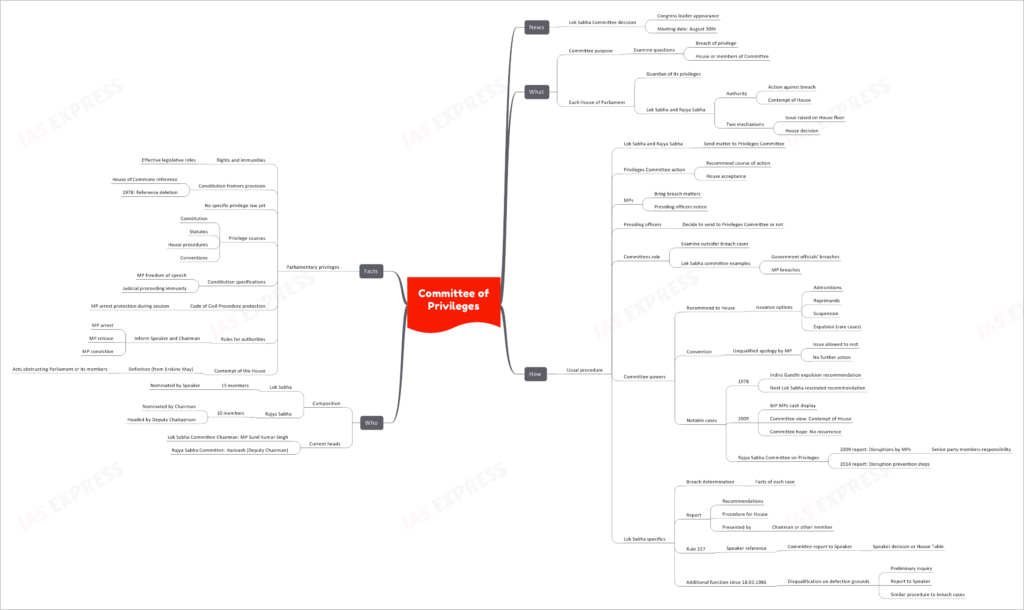Committee of Privileges

Recent news has highlighted the pivotal role played by the Committee of Privileges within the Indian parliamentary system. This committee is entrusted with maintaining the integrity of parliamentary proceedings and upholding the privileges of its members. The Lok Sabha Committee’s recent decision to examine a breach of privilege involving a Congress leader’s actions has once again brought attention to its significance.
This topic of “Committee of Privileges” is important from the perspective of the UPSC IAS Examination, which falls under General Studies Portion.
What is the Committee of Privileges?
The Committee of Privileges holds a crucial position in the Indian parliamentary framework. Its main purpose is to examine questions concerning breaches of privilege, whether these involve the House itself or its individual members. Every House of Parliament, be it the Lok Sabha or the Rajya Sabha, acts as the guardian of its privileges. These privileges encompass various rights and immunities that enable members to effectively fulfill their legislative roles.
Authority and Mechanisms
Both the Lok Sabha and Rajya Sabha have the authority to take action against breaches of privilege and contempt of the House. Two mechanisms are in place to address such matters:
- Issue Raised on the House Floor: Any breach of privilege can be raised on the floor of the House.
- House Decision: The House decides whether the matter should be referred to the Privileges Committee.
How Does the Committee Function?
The usual procedure for addressing breach of privilege matters involves:
- Lok Sabha and Rajya Sabha sending the matter to the Privileges Committee.
- The Committee recommending a course of action, subject to the House’s acceptance.
- MPs bringing breach matters to the attention of presiding officers.
- Presiding officers deciding whether the matter should be referred to the Privileges Committee.
The Committee plays a significant role in examining breach cases, including those involving outsiders. Some notable examples from the Lok Sabha include breaches by government officials and MPs. The Committee has the power to recommend various actions, such as admonitions, reprimands, suspension, and even expulsion (in rare cases).
Convention and Notable Cases
An interesting convention involves the unqualified apology by an MP. If the MP apologizes, the issue can be allowed to rest without further action. Notable cases in the Committee’s history include the 1978 recommendation for Indira Gandhi’s expulsion, later rescinded by the next Lok Sabha. In 2009, the Committee addressed BJP MPs’ cash display and expressed hope for no recurrence. The Rajya Sabha Committee on Privileges also has reports from 2009 and 2014, focusing on disruptions and prevention steps.
The Lok Sabha specifics entail a thorough determination of breach facts and a subsequent report containing recommendations, procedure details for the House, and presentation by the Chairman or other members. Rule 227 empowers the Speaker to refer the Committee’s report, and the Speaker’s decision or the House’s table follows this.
An additional function since March 18, 1986, involves disqualification on defection grounds, following a preliminary inquiry and reporting to the Speaker.
Who Comprises the Committee?
The Committee’s composition is significant in ensuring impartiality and diverse representation. In the Lok Sabha, there are 15 members nominated by the Speaker, while the Rajya Sabha has 10 members nominated by the Chairman, with the Deputy Chairperson heading the committee.
Current Heads
As of now, the Lok Sabha Committee is chaired by MP Sunil Kumar Singh, and the Rajya Sabha Committee is led by Harivash, the Deputy Chairman.
Parliamentary Privileges in Perspective
Parliamentary privileges encompass the rights and immunities granted to members, allowing them to fulfill their legislative duties effectively. These privileges find their origin in the Constitution, statutes, house procedures, and conventions. The Constitution specifies the freedom of speech for MPs and provides immunity in judicial proceedings.
Protecting MPs’ Rights
The Code of Civil Procedure extends protection to MPs during sessions, shielding them from arrest. Rules dictate that authorities must inform the Speaker and Chairman regarding an MP’s arrest, release, or conviction. Contempt of the House is defined as acts obstructing Parliament or its members, as outlined by Erskine May.

